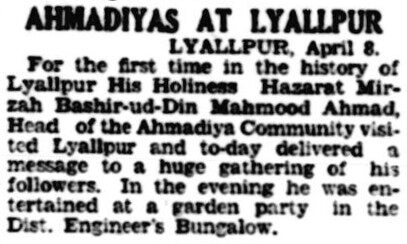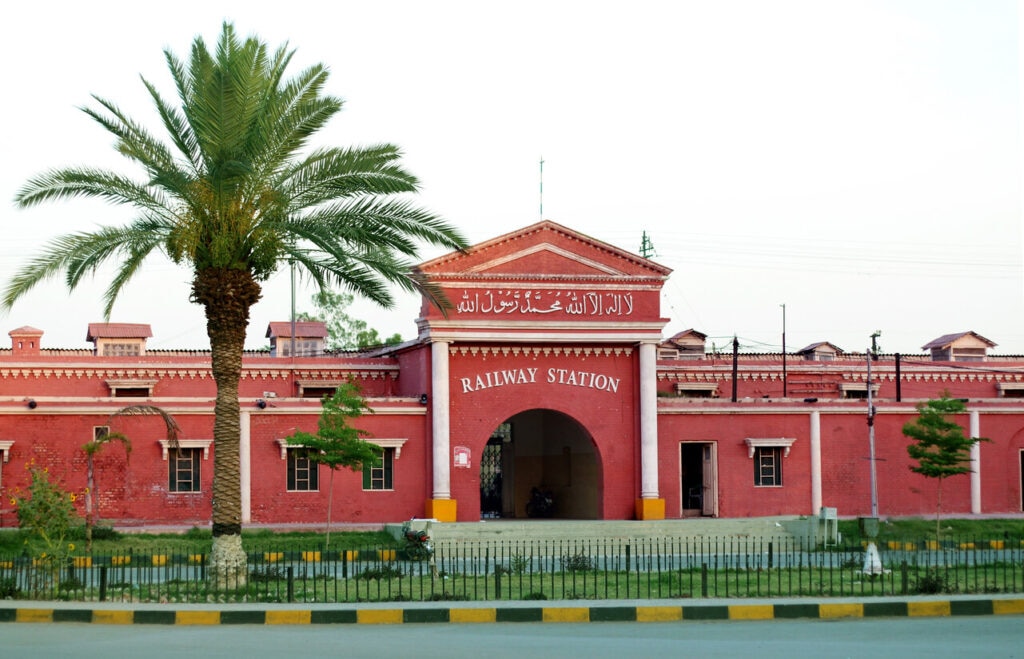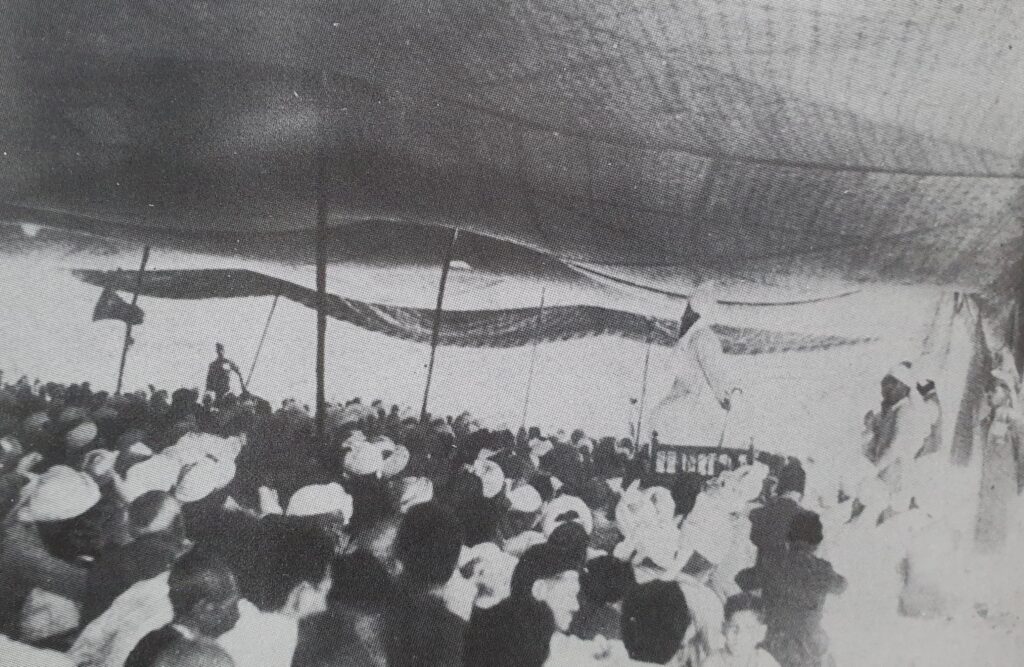Ata-ul-Haye Nasir, Ahmadiyya Archive & Research Centre

Exactly 89 years ago, on 7 April 1934, Hazrat Musleh-e-Maud, Mirza Bashiruddin Mahmud Ahmadra departed from Qadian for his first-ever visit to Lyallpur (now Faisalabad), British India. (Al Fazl, 8 April 1934, p. 1)
Warm welcome at the Lyallpur railway station
Huzoorra reached the Lyallpur railway station at 1:15 pm, where Ahmadis were present in huge numbers to welcome their beloved Imam. The people present there also included various non-Ahmadi Muslims, Hindus, Parsis, and Sikhs from all walks of life, such as government officials, lawyers, barristers, municipal commissioners, and local dignitaries. (Al Fazl, 12 April 1934, pp. 1-2)
When Huzoorra disembarked from the train, he was welcomed with rose petals and garlands. People were lined-up in two rows outside the station, and Ahmadi volunteers were taking care of the discipline. The police were managing the situation very well, and the superintendent of police was also present there. (Ibid.)

Huzoor’sra address to Ahmadis
On the same day, Huzoorra delivered a short speech. At the beginning of his speech, mentioning the reason behind his visit to Lyallpur, Huzoorra said that Lyallpur was one of those areas where new settlements or colonies were being established under British rule – known as the “Punjab Canal Colonies” – and from this perspective, it was like a “new world.”
Hazrat Khalifatul Masih IIra went on to say:
“The Promised Messiahas had also seen a kashf [divine vision], which indicates that he came to create a ‘new world’. Therefore, I deemed it important to visit the place where a ‘new world’ is developing, in order to fulfil one aspect of that kashf in which the Promised Messiahas saw that he had created a new heaven and a new earth. [Tadhkirah [English], pp. 248-250]
“The true meaning of this [kashf] is that a new spirit will be created in the whole world through him [the Promised Messiahas]. However, a partial meaning implies the propagation of Faith among the people of the ‘new world’ which is being established [in various places, such as Lyallpur]. Therefore, I decided to visit here in light of such desires in my mind that Allah the Almighty may strengthen Ahmadiyyat in this area, so that along with the earthly population, a spiritual population may also establish here.” (Al Fazl, 15 April 1934, p. 5)
The significance of Lyallpur towards which Huzoorra indicated is that after the annexation of Punjab in 1849, the British formulated a plan of Canal Colonisation in Punjab, and established nine canal colonies from 1885 to 1940, known as the “Punjab Canal Colonies.” Chenab Colony was the largest one, and covered the whole of Lyallpur district, along with some parts of the Jhang, Gujranwala and Lahore districts.
These colonies were situated in the inter-fluvial tracts, or doabs, west of the Beas-Sutlej and east of the Jhelum Rivers. Each project was based upon a major canal, and its network of branches and distributaries, the construction of which preceded a later process of migration and colonisation. Canal construction took place primarily in tracts that were hitherto uncultivated, and were but sparsely inhabited by a semi-nomadic population of cattle graziers and camel-owners. (The Punjab Canal Colonies, 1885-1940, Imran Ali, 1979, The Australian National University, Canberra)
During his speech, Huzoorra also expressed that though he had not been feeling well for the last few days, he did not cancel his visit to Lyallpur, since he thought of the hundreds of people who had come there from very far places to meet their Imam.
Local jalsa of Jamaat Lyallpur
On 7 and 8 April, Jamaat-e-Ahmadiyya Lyallpur held its local jalsa.
On the first day of the jalsa, Hazrat Musleh-e-Maudra led the Maghrib and Isha prayers at the jalsa gah, and granted everyone an opportunity to shake hands with him. (Al Fazl, 12 April 1934, p. 2)
On the second day, Huzoorra led the Zuhr and Asr prayers at the jalsa gah and then delivered a speech, in which he spoke about the seeking of Truth, and shed light on the death of Jesusas and the Promised Messiah’sas truthfulness. In addition to the Ahmadis, the audience included people of various other faiths belonging to various walks of life. (Ibid.)
Huzoorra said:
“Respected brothers, Allah the Almighty has created mankind to fulfil very great objectives. However, despite the fact that mankind has been created with extraordinary wisdom to fulfil such great objectives, the very thought of which fills one’s heart with fear, they incline towards such petty and less-important objectives that this act of theirs stuns any wise person upon witnessing their situation.
“In regards to a certain objective behind the creation of mankind, all religions of the world – regardless of which country they belong to or which revealed book they believe in – agree to the fact that the creation of mankind has occurred to create a connection with God and to attain His nearness. Moreover, there is no disagreement on this point among various religions. You may ask the scholars of the Hindu faith, and they will tell you that the purpose behind the creation of mankind is for them to immerse themselves in [the love of] their Creator. You may ask the Jews, and they would also tell you that the sole purpose behind mankind’s creation is for them to attain the nearness of God. The Muslims also hold the belief that the one who does not desire to seek Allah the Almighty, is [spiritually] blind and commits a sin. The Christians also claim that the one who inclines towards God is granted His nearness. The Sikhs, Zoroastrians, etc. also say that the true purpose behind the creation of mankind is for their hearts to become the abode of God.
“Now ponder over the greatness of this objective, and then look upon the situation of mankind; one finds that […] generally, people do not make efforts to fulfil the purpose for which God has created them. It is a fact that one cannot reach their desired destination until one follows the pathway that could lead them there. Therefore, the true need toward which we should pay attention is for us to bring seriousness to our hearts in regards to seeking God Almighty. If this is not the case, then there can be no benefit in claiming to be a Muslim. […] The followers of all religions agree to the fact that one cannot achieve [the objective] by merely adopting a title [such as Muslim, Hindu, Christian, Jew, etc.]. In fact, to achieve this, one is required to inculcate the fear of God in their heart. If they achieve this [fear of Allah], then it is impossible for them to go astray, regardless of how many shortcomings they might have, Allah the Almighty’s love will surely attract them [toward the right path]. […] In short, if one understands the objective for which they have been created, they can never indulge in any mockery or ridicule towards the religion. In this way, their hearts remain filled with the fear of Allah, and they understand that […] they are required to make a strong connection with God.” (Al Fazl, 17 April 1934, pp. 5-6)

Addressing the opponents of Ahmadiyyat, Huzoorra further said:
“O servants of God, Allah the Almighty has created you for a great objective, thus, you should shun those acts that repel you from this very objective, and instil the love, longing, and fear of God in your hearts since these are the only means that could lead you to God, and they can impact other people’s hearts as well. […] The truth always finds its way [to success], and the falsehood can never stand and can never become victorious, regardless of how great efforts are made to strengthen it.” (Ibid., p. 6)
Huzoorra added:
“The aim of those who devote themselves wholly to God is to bring people towards Allah the Almighty with love, instead of repelling them through hate. Therefore, if one is truthful in their claim to have found the Truth, their utmost effort will be to bring people towards God, instead of repelling them away.” (Ibid.)
Huzoorra then mentioned the fact that all prophets and ma’murin [appointees] of God are opposed, and while mentioning the opposition faced by the Holy Prophetsa, Huzoorra narrated the incident of Tai’f, where the opponents threw stones at the Holy Prophetsa, which caused him severe injuries.
Huzoorra then mentioned the opposition faced by the Promised Messiahas and his Jamaat and narrated the incident of the martyrdom of Hazrat Sahibzada Abdul Latifra.
Huzoorra continued by mentioning an incident that took place during his journey to Mecca for Hajj in 1912. During the journey, a barrister from Lyallpur initiated religious discussion and upon finding out that Huzoorra is an Ahmadi, he prolonged the discussion and, in some instances, used harsh words against the Promised Messiahas, but Huzoorra responded with calm. However, when he found out that Huzoorra is the son of the Promised Messiahas, he came to him very frightened and apologised. Huzoorra responded to him by saying, “There is no need to worry. I wanted you to express whatever your objections are.”
Huzoorra continued:
“Our sole objective is to foster a connection between God and His servants. In this, we have no hidden vested interests. […] If anyone can prove to us that it is impossible for one to seek God Almighty through the Promised Messiahas, but rather through their teachings instead, we will be ready to follow them as servants.” (Ibid., p. 7)
Since a tea party was scheduled to be held in Hazrat Musleh-e-Maud’sra honour, Huzoorra delivered his speech in two parts, one before the tea party, and the second part began at 9pm after the tea party. The total duration of the speech was more than four hours.
Tea Party
The tea party was arranged by Jamaat-e-Ahmadiyya in Huzoor’sra honour, at the Dist. Engineer’s Bungalow. It was attended by various local dignitaries and government officials as well, including the Superintendent of Police. At the end of this reception, Huzoorra delivered a short speech, in which he outlined the pathway to achieve inter-faith harmony and unity. (Al Fazl, 12 April 1934, p. 2)
The opposition
The opponents of the Jamaat had left no stone unturned to halt the above-mentioned jalsa, however, by the grace of Allah the Almighty, the event was a great success and was attended by no less than 6,000 people from all walks of life and faiths. Following the announcement about the holding of this jalsa, the opponents published hateful edicts and tried to stop people from attending the jalsa. Hurdles were created in Jamaat’s obtaining the site for the jalsa, the caterers who were to provide tents, etc., were threatened that in case they provided the items for the jalsa, the items would be burned. A day before the jalsa, an attempt was made to redirect the water from a nearby canal towards the jalsa gah. However, the alertness of Ahmadis foiled their plan. Despite all this, various non-Ahmadis attended the event, and the president and members of the local municipality cooperated with the Community in holding this event. The local police were also very cooperative in this regard. Particularly the Sikh community gave a great helping hand during all these times. On the occasion of this jalsa, around 150 people took bai’at as well. (Ibid.)
The Civil and Military Gazette reported:
“AHMADIYAS AT LYALLPUR
“LYALLPUR, April 9.
“For the first time in the history of Lyallpur, His Holiness Hazrat Mirza Bashir-ud-Din Mahmood Ahmad, Head of the Ahmadiya Community visited Lyallpur and today delivered a message to a huge gathering of his followers. In the evening he was entertained at a garden party in the Dist. Engineer’s Bungalow.” (The Civil and Military Gazette, 10 April 1934, p. 13)

A short stay in Jaranwala
Huzoorra departed from Lyallpur at around 8 am on 9 April. Upon the request of a member of Jaranwala Jamaat, Dr Muhammad Shafi Sahib, Huzoorra stopped at his house in Jaranwala on the way back to Qadian, and had breakfast there. (Al Fazl, 17 April 1934, p. 7)
A short stay in Ahmadpur
Huzoorra departed from Jaranwala and made another stop in the village of Ahmadpur, at the house of Malik Ghulam Muhammad Sahib, where the local Ahmadis had the opportunity to meet Huzoorra and some ladies took bai’at as well. Huzoorra also delivered a speech in Punjabi. During his speech, Huzoorra called the members’ attention to the purpose of their creation, i.e., to attain the love and nearness of Allah the Almighty. Huzoorra said that everyone is required to pay attention to this objective, and these are the true meanings of Faith. To achieve this purpose, it is not essential for one to be well educated, since Allah the Almighty has nullified this excuse by sending down the Perfect Religion – Islam – through the Holy Prophet Muhammadsa, who was unlettered himself. Thus, being uneducated is not a hurdle in one’s learning the Faith. One should learn the meanings of Surah al-Fatihah and offer salat with great humbleness and attention. Moreover, one should pay attention to prayer [dua]. In the end, Huzoorra reminded the attendees about remembering the objective behind their creation, learning the Faith, and following it as well. (Ibid.)
Return to Qadian
On 9 April, Huzoorra returned to Qadian at around 9pm. (Al Fazl, 12 April 1934, p. 1)
Huzoor’sra impressions of the visit
Mentioning his impressions about this visit during his Friday Sermon on 13 April 1934, Huzoorra said that the opposition to Ahmadiyyat is at its peak and the opponents are leaving no stone unturned to harm and discredit the Jamaat in the eyes of the public and the government through various tracts, books, announcements, newspaper articles, and lectures, but “I have also reached a conclusion that despite all these oppositions, people are ready to listen to our views as well, and they desire someone to make them aware of the views of the Jamaat. On the occasion of my visit to Lyallpur, some of the staunch opponents tried their utmost to somehow prevent people from paying attention to [the Jamaat]. However, despite the fact that the local jamaat is very small there, […] and despite the prevailing circumstances, people did not care about the opposition carried out by the opponents. On average, the attendance [during the two days of jalsa] was thought to be between 3 and 6 thousand, and before that, I had never witnessed outside Qadian such a vast gathering of people in an open field as that witnessed at the Jalsa Salana in Qadian. […]
“But the point is not that the jalsa gah was full of people, in fact, the point to ponder is that people from all walks of life attended it, despite severe opposition and even the edicts from the opponent ‘ulema that in the case of meeting Ahmadis, their nikah would be broken. The attendees included both dignitaries and the general public. From this, we come to know that if, on the one hand, we are facing problems due to the efforts of our opponents, on the other hand, their opposition is bringing the attention of the people [towards Ahmadiyyat], instead of halting the ways of our tabligh.” (Al Fazl, 19 April 1934, p. 5)
Huzoorra further said:
“Look, it was this very opposition that led them here. […] In many instances, the opposition ultimately proves fruitful. I have concluded from this visit that, despite the opposition, we are receiving the grace of God Almighty in that, with the help of this opposition, the people are gradually inclining towards Ahmadiyyat. […] A seed has already been sown in [the hearts of] those 3 to 6 thousand people who attended the jalsa, which will manifest itself tomorrow, if not today, or in the next month, if not this month. If they have attended our jalsas with an interest, despite the threats of their nikah being broken, it indicates that they have a passion in their hearts for seeking the truth, which will surely manifest its impact one day.” (Ibid., p. 6)
Huzoorra then mentioned that various non-Ahmadi Muslims, Sikh people, municipal officers, police officers and other dignitaries provided great cooperation to the Jamaat amidst all these circumstances:
“It tells us that, by the grace of Allah the Almighty, the good-natured people have sympathetic sentiments in their hearts towards us. Moreover, they realise that the ignorant people oppose [Ahmadiyyat] for their personal objectives only, and this Community is serving the country and nation.” (Ibid.)

